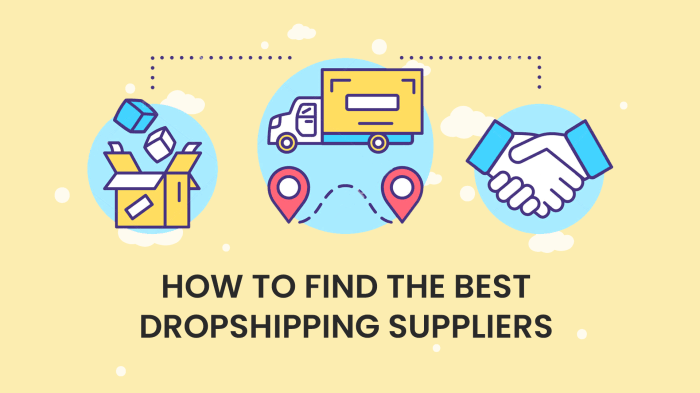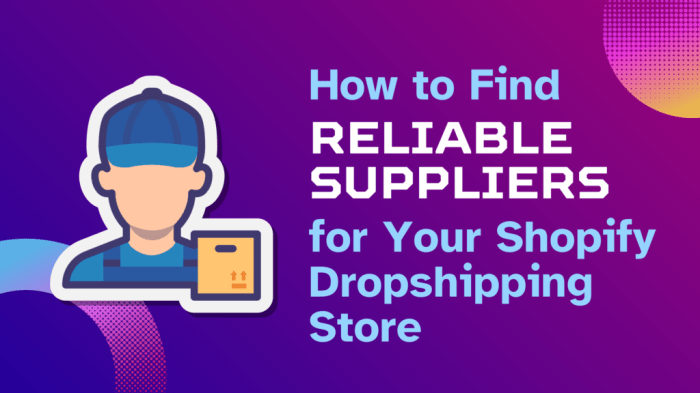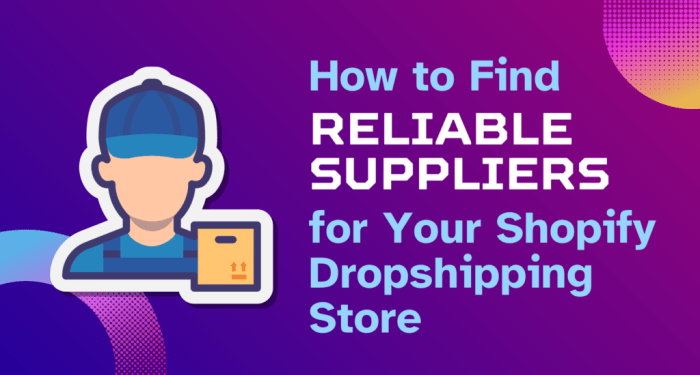Embark on a journey to discover the key strategies in finding reliable suppliers for dropshipping. From researching potential partners to evaluating supplier performance, this guide covers all you need to know to ensure a successful dropshipping business.
Researching Potential Suppliers
Researching potential suppliers is a crucial step in ensuring the success of your dropshipping business. By thoroughly evaluating suppliers before making a decision, you can avoid potential pitfalls and build a strong foundation for your business.
Key Criteria for Evaluating Suppliers
- Supplier Reliability: Look for suppliers with a proven track record of delivering products on time and as described.
- Product Quality: Quality products are essential for customer satisfaction and repeat business.
- Shipping Times: Fast and reliable shipping is crucial for meeting customer expectations and reducing delivery times.
Methods for Finding Trustworthy Suppliers
- Online Platforms: Utilize platforms like Alibaba, AliExpress, or Oberlo to find reputable suppliers with positive reviews.
- Directories: Explore industry-specific directories like SaleHoo or Worldwide Brands to discover reliable suppliers in your niche.
- Trade Shows: Attend trade shows and networking events to connect with potential suppliers in person and establish relationships.
Contacting Suppliers
When reaching out to potential suppliers for dropshipping partnerships, it is crucial to establish clear communication and gather relevant information to assess their credibility and capabilities. This process sets the foundation for a successful and mutually beneficial business relationship.
Types of Questions to Ask Suppliers
- Ask about their experience in dropshipping and the industries they specialize in.
- Inquire about their product range, quality control measures, and fulfillment processes.
- Discuss their shipping methods, delivery times, and return policies.
- Request information on pricing, minimum order quantities (MOQs), and payment terms.
- Seek clarification on how they handle customer inquiries and resolve issues.
Importance of Clear Communication
Effective communication with suppliers is essential to avoid misunderstandings and ensure smooth operations. Clearly defining pricing agreements, MOQs, and shipping terms helps prevent disputes and establishes trust between both parties.
Negotiating and Building Relationships
- Be open to negotiating favorable terms that benefit both your business and the supplier.
- Build a good rapport by maintaining professionalism, being respectful, and showing appreciation for their services.
- Regularly communicate with suppliers to address any issues promptly and foster a strong partnership.
- Consider visiting suppliers in person or scheduling video calls to strengthen the relationship and gain a better understanding of their operations.
Evaluating Supplier Performance
When it comes to dropshipping, evaluating supplier performance is crucial to ensuring a smooth and successful business operation. By tracking and assessing various factors related to your suppliers, you can make informed decisions that benefit your business in the long run.
Monitoring Supplier Performance
It's essential to monitor key aspects of supplier performance to maintain a high level of service for your customers. This includes tracking factors such as product quality, delivery times, and customer feedback.
- Product Quality: Regularly inspect the quality of the products your suppliers are providing. Look for any defects, damages, or inconsistencies that could affect customer satisfaction.
- Delivery Times: Keep track of how long it takes for orders to be processed, shipped, and delivered to customers. Timely delivery is crucial for maintaining customer trust and loyalty.
- Customer Feedback: Pay attention to customer reviews and feedback regarding the products they receive. Use this information to identify any recurring issues or patterns that may point to supplier performance issues.
Resolving Issues and Maintaining Relationships
When issues arise with suppliers, it's important to address them promptly and effectively to maintain a positive working relationship. Communication is key in resolving conflicts and finding mutually beneficial solutions.
Openly communicate your concerns with the supplier and work together to find solutions that benefit both parties.
Key Performance Indicators
Key performance indicators (KPIs) can help you measure supplier reliability and efficiency. These metrics provide valuable insights into the performance of your suppliers and can guide your decision-making process.
| Key Performance Indicators | Description |
|---|---|
| On-time Delivery Rate | Percentage of orders delivered on time as promised by the supplier. |
| Defect Rate | Percentage of products that are defective or damaged upon arrival. |
| Customer Satisfaction Rate | Percentage of satisfied customers based on feedback and reviews. |
Diversifying Supplier Network

When running a dropshipping business, diversifying your supplier network can bring a range of benefits to your operations. By spreading your risk across multiple suppliers, you can reduce the impact of disruptions from a single source. This can lead to increased flexibility, better pricing options, and improved product availability for your customers.
Finding New Suppliers
One strategy for diversifying your supplier network is to actively search for and onboard new suppliers regularly. This can involve attending trade shows, networking events, and using online platforms to discover potential partners. By expanding your pool of suppliers, you can decrease your reliance on any single source and create more options for your business.
Balancing Costs, Quality, and Reliability
- Consider negotiating pricing agreements with new suppliers to ensure competitive costs while maintaining quality standards.
- Conduct thorough research and background checks on potential suppliers to assess their reliability and performance history.
- Establish clear communication channels and expectations with each supplier to maintain consistency and transparency in your partnerships.
Managing a Diverse Supplier Network
Successfully managing a diverse supplier network requires effective organization and communication. Here are some tips to ensure a seamless supply chain:
- Implement a robust inventory management system to track orders and stock levels from multiple suppliers.
- Regularly review supplier performance metrics to identify areas for improvement and address any issues promptly.
- Develop strong relationships with each supplier to foster collaboration and trust in your partnerships.
Wrap-Up

In conclusion, by following the steps Artikeld in this guide, you can establish a strong network of trustworthy suppliers for your dropshipping business. With a focus on quality, reliability, and communication, you'll be well-equipped to navigate the world of dropshipping with confidence.
General Inquiries
How important is it to research potential suppliers before making a decision?
Researching potential suppliers is crucial as it helps in ensuring reliability, product quality, and timely shipping, which are essential for a successful dropshipping business.
What are some key criteria to consider when evaluating suppliers for dropshipping?
Key criteria include supplier reliability, product quality, shipping times, pricing, MOQs, and communication capabilities.
Why is it important to diversify your supplier network for dropshipping?
Diversifying your supplier network helps in reducing reliance on a single source, balancing costs, quality, and reliability, and ensuring a seamless supply chain.













